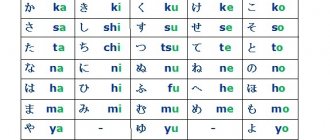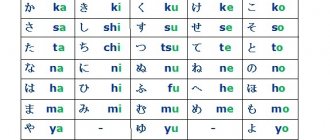Russian-Japanese phrasebook: how to explain yourself in an unfamiliar country. Popular phrases and expressions for travelers.
- Last minute tours
around the world
Japanese (日本語, Nihongo) is a language spoken by about 125 million people. Thanks to the many isolated islands, the country has more than a dozen dialects. They differ both in vocabulary, morphology, and pronunciation. Common dialects include Kansai-ben (関西弁), Tohoku-ben (東北弁) and Kanto-ben (関東弁), the dialect of Tokyo and the surrounding area. Speakers of different distant dialects often do not understand each other (even though every Japanese knows standard Japanese). Based on the Tokyo dialect, a “common language” (共通語 kyotsugo) was formed.
Foreigners learning Japanese should be aware of the differences between masculine and feminine forms of speech.
The convenient word “domo” in Japanese means a whole scattering of actions or emotions, for example: hello, thank you, good, long time no see, sorry, and so on. The word “i desu,” on the contrary, can lead to a difficult situation. Despite the fact that it is translated as “good,” it means “thank you, no need.” If you agree, you should say “itadakimasu”; the same word is said when sitting down at the table.
Greetings, general expressions
Good morning Ohayo: gozaimas Good evening Kombanwa Good night Oyasumi nasai Hello, how are you? Konnichiwa, o-genki des ka? Thank you, everything is fine Genki des Goodbye! Sae: nara Please excuse me Sumimasen My name is... Watashi wa... des Nice to meet you. My name is Kimura. I ask you to love and favor Hajimemashite. Watashi wa Kimura desu. Do:zo yoroshiku.Thank you Arigato I want to change money O-kane-o ryo:gae shitai de I don’t understand Wakarimasen Do you understand English?Anata wa eigo ga wakarimasu ka?I’m not very comfortable...Totto tsugo: ga waruin desu ga...Are you Mr. Tanaka? Yes. Ya TanakaAnata wa Tanaka-san desu ka? Hi. so: desu. Watashi wa Tanaka desu'Allo, this is Mr. Tanaka's apartment? Moshimoshi. Tanaka-san no o-taku desu ka? No. I'm not Japanese Iie, Watashi wa Nihonjin jya nai. I'm RussianWatashi wa Roshiajin desu DaHaiNet Iie Thank you very much Do: mo arigato: gozaimas Thank you Taihen arigato: gozaimas You're welcome Do: itashimasite No thanks O-rei niwa oyobimasen Nothing, don't worry Nandemo arimasen Thanks for the service Go-ku ro: sama deshita Thanks for the invitation Go-sho : tai arigato: gozaimas What is your name? Nan toyu: o-namae des-ka? Please tell me Totto sumimasen ga Please come in O-hairi kudasai This way, please Do: zō koutirae do: zō What is your first and last name? O-namae to myo: dzi-wa nan -to iimas-ka?Thank you for the warm welcomeGo-shinsetsu arigatoCan you help me?Onegai itashimas?I want to invite you to RussiaRussia ni go-sho: tai shitai to omoimasI want to invite you to the RestaurantResutoran ni go-sho: tai shitai to omoimasThank you for help (for cooperation) Go-kyo: ryoku arigato: gozaimas Thanks for the gift Presento arigato: gozaimas What is this? Kore wa nan des-ka? Why? Naze des-ka? Where? Doko des-ka? Who is it? Kono hito wa Donata des -ka?I'm thirstyNodo ga kawakimashitaI'm hungry (I'm hungry)O-naka ga suiteimasI'm lostMiti ni mayottaYaWatashiYou(you)AnataOnKareSheKanojoWomanJoseiManDanseiBigOokySmallChisaiHotAtsuiColdSamuiHotAtakaiColdTsumetaiGood iiIiBadWarui Let's take a photo together Isshoni shasin-o torimasho Call an interpreter Tsu: yaku-o yonde kudasai Please speak more slowly Mo: sukoshi yukkuri itte kudasaiWhat is the translation of the phrase: Totto matte kudasai?
How is Rip translated?
May you rest in peace. From Latin Requiescat in pace. Nowadays the more common translation is “rest in peace”, which is due to the inaccuracy of the translation from English
How is arigato translated from Japanese?
Why is Jotaro Kujo so cool?
Because everyone loves a bad boy with a good heart. Dressed like the most criminal schoolboy in his class, who doesn’t care about all the rules of society. But the love given by his birth mother makes him be on the verge of good and bad. Cruelty was forged in him, which he was able to direct into justice with his mind. He is smart and cunning, cruel and good-natured, fair and cold-blooded, calculating and caring. He is the perfection of justice . He is also fashionably dressed, pumped up and handsome.
What does Baba Booey mean and why did it become a meme?
Once on a TV show (I don’t remember the name) a person was asked one question (I don’t remember the name again XD) and in his answer he mispronounced the name of a cartoon character. The name of that hero is Papa Louis, and he got it as Bababuy. A few years later, this phrase went viral and became a meme. There is no meaning to it, it's just a catchphrase.
How to pronounce Feci quod potui, faciant meliora potentes?
If you speak in front of a Russian-speaking audience, then “Fétsi kvod potui, faciánt melyora potentes”
"B" is closer to "U", "Yo" is closer to "Io".
Numbers and numbers
NuldzeroOdiniti hitotsuDwani futatsuTrisan mizzuFour four yotsuFive itsutsuSixroku mutsuSevencity nanatsuEighthati yatsuNine kokonotsuTenju:toFurther in the counting, the tens of “ju” are joined by the corresponding number, showing units...
| eleven | ju:-iti |
| twelve | ju:-ni |
| thirteen | ju:-san |
| fourteen | ju:-si |
| fifteen | ju:-go |
| sixteen | ju:-roku |
…and so on. To designate tens from 20 onwards, you need, on the contrary, to add tens of “ju” to the ones...
| twenty | no-ju |
| thirty | san-ju |
| fourty | c-ju |
| eighty | Hachi-ju |
| ninety | ke-ju |
| one hundred | hyaku |
Next, the numbers are formed according to the same model: that is, units are added to 100 “hyaku”, and then tens and units.
How to say thanks in Japanese in different situations
If you are treated to dinner, then before starting the meal you need to say itadakimasu, this is the equivalent of our “bon appetit”. And after having dinner, it is customary to say gochisou sama deshita.
いただきます - itadakimasu - itadakimas - bon appetit
When the work day is over, you can say otsukaresama desu, which roughly translates to “thank you for a good day at work/thank you for your hard work.” Literally it will be “you are very tired from work.”
With a phrase like this, you express your gratitude for hard work and tell the person that he has worked hard all day and now it is time to rest.
Osaka has its own dialectical expression for expressing gratitude: ookini. It means “thank you” or “please”. Ookini should be used at the end of a sentence for polite address.
If earlier this word was used together with arigatou, that is, ookini arigatou, today the shortened version ookini is popular.
For the good of the cause
Please show me Misete kudasai Stop for the night Tomaru I can’t believe it! Shinjirarenai Wow! Sugo-oh!! I want to buy...... about kaitai I want to eat...... about tabetai I want to go to...... or ikaitai That’s how! Look! (said very often) A soo! Soo! Sooka!Itchy!Kayuy!Can you see Mount Fuji from here?Fujisan, ga miemasu ka?Sorry. Where is the embassy? Sumimasen, taishikan wa doko desu ka? How should you eat sushi? O-sushi wa do: yatte tabemasu ka? You can’t eat on the lawn in this park Kono ko: en wa Shibafu no naka de o-bento: ga taberaramasen Do you need to take off your shoes ?Kutsu o nugun desu ka?Do you know that there was an earthquake this morning? How, really? Kesa jishin ga atta no o shitte masu ka? Eh, honto: desu ka?Train station, airport
Where can I check the train schedule? Ressha-no jikokuhyo:-wa doko desho: ka? Excuse me, where is the information desk? Sumimasen ga, annaisho-wa doko des-ka? Is there a train connection with the city from here? Koko-kara - made tetsudo:-ga tsujite imas-ka? How many hours (days) does the train go to the city? Shi-made kisha-de nan-jikan-gurai (nan-niti-gurai) des-ka? Does this train go to the city? Kono kisha-wa Si-e ikimas-ka? What time is the next train to? Yuki-no tsugi-no ressha-wa nan-ji des-ka? Excuse me, how do I get to the train station? Chotto o-tazune-shimas ga, eki-e-wa (teishaba-e-wa) to: ittara ii desho: ka? Tell me, where is the ticket office? Kippu-uriba-wa doko des-ka? How much does a ticket cost? Kippu-wa ikura des-ka? Can I return the ticket and get my money back?Kippu no haraimodoshi-o site itadakemas-ka?Is this seat free?Kono seki-wa aite imas-ka?How much is the plane ticket to?Yuki no hiko: ki no kippu- wa o-ikura des-ka?How many hours is the flight to?...made nanjikan kakarimas-ka?How many kilograms of luggage are you allowed to carry for free?Ju: ryo:-seigen-wa nan-kiro-made des-ka?Will the plane take off exactly on schedule? Hiko: ki-wa yotei-do: ri shuppatsu shimas-ka? Eki Waiting room MatiaishitsuArigato Lifestyle
It's no secret that Japanese cuisine is an incredible combination of tastes and aromas. These are amazing spices that do not overshadow the taste of products, but only highlight them. Residents of the Land of the Rising Sun prefer natural and natural ingredients. This formed the basis of Japanese cuisine, the traditions of which have a long history.
"Arigato" is a sushi bar that respects all the nuances of the culinary art of this country. In the establishments of this brand you can meet lovers of exotic foods, supporters of healthy and proper nutrition, and simply connoisseurs of oriental cuisine.
High-quality and tasty dishes are complemented by professional and friendly service. Service at Arigato is not only about the friendly smiles of the staff. You can order food at home, and it will be delivered to you as soon as possible. Many visitors to sushi bars under this brand come here again and again to plunge into the extraordinary atmosphere of the cozy and hospitable East.
Passport control
Fill out the entry (exit) form Nyu: koku (shukkoku) ka: do-o kinyu: si-te kudasai Present your passport Pasupo: to-o haiken shimas Please, here is my passport Do: dzo, watashi no pasupo: to de I am a tourist Watakushi-wa Kanko: deI came on trade business Shoyo: de kimashitaCustoms inspection of luggageZeikan tenimotsu kensaPlease show your customs declarationZeikan shinkokusho-o misete kudasaiI have nothing to write down in the declarationZeikan-ni shinkoku surumono-wa arimasenThis is my luggageKore-ga watakushi -no nimotsu desNet Do you have any prohibited items? Kinseihin-wa arimasen n. eh.? This suitcase and this bag are my Watashi-no-wa kono toranku to baggu des Please open (close) your suitcase Kono toranku-o akete (shimate) kudasai These are my personal belongings Sore-wa watashi-ga jibun-de tsukau mono des Which one you currency?Do: yu: gaika-o-mochi des-ka?Here is my luggage receiptKore-ga tenimotsu uketori bango: desCafes and shops
How much does it cost? Kore wa o-ikura des ka? Can I pay with a credit card? Kureditto ka:do de haratte mo ii des ka?When will the dry cleaning be ready?Kuri:ningu wa itsu dekimasu ka?Is this watch made in Japan?Sono tokei wa nihonsei desu ka?Where can I buy?Wa doko de kaemaska?Do you have it?Arimaska?Show me this please Sore o misete kudasaiCan I try this on?Kite mite mo ii deska?Women's clothingFujin fukuMen's clothingShinshi fukuProductsSyokuryo: hinPlease tell me , where is the shopping center (neighbourhood)? Sumimasen ga, sho: tengai-wa doko des-ka? I need to buy milk and bread Is there a grocery store nearby? Pan to po: nu: -o kaitai, no des ga, kono hen-ni shokuryo: hinten-ga arimasen-ka How much do I charge for everything? Dzembu-de ikura-ni naru, but des-ka? Please give me a check Tekku-o-negai shimas I want to see the camera (video camera) Camera-o mitai, but des gaTwo coffees please Ko:hi:futatsu o-negai ShimasuNo. I'm already full. Thanks for the treat. Mo: ippai desu. Gothiso: sama deshita Is this cake delicious? No. Not very tasty Sono ke:ki wa oishi desu ka? Eee. amari oishiku nai desuOh, how delicious it was! Aah, oishikatta! Waiter! Chotto, sumimasen Menu, please Menu: kudasai What would you recommend? About susume wa nandeska? How do they eat it? Kore o do: yatte tabemaska? Japanese dishes Washoku Western dishes Yo: cheek Beef Gyu: niku Pork B utanikuChicken TorinikuFishSakanaPotatoesPote : toRiceGohanBreadPanSaladSaradaSoup: puVegetablesYasaiFruitKudamonoDessertKudamonoSaltShchioSugarSatoSoy sauceShyoyuCoffee (hot)Hotto ko: hiCoffee (iced)Aisu ko: hiBlack teaKo: chaGreen teaO: chaWine (red)AkauainWine (white)Sh Irouine Rice vodka Sake Thank you, I don't drink Do: mo arigato, watakushi-wa nomasen Please, please coffee and scrambled eggsKo:hi:to tamago no medamayaki-o-negai shimasIn the city, transport
Where is the hotel? Hoteru wa doko ni arimas-ka? Where is the bank? Ginko: wa doko ni arimas-ka? How to get to the hotel? Hoteru made wa do: ittara ii des-ka? Where can I buy a telephone card? Terehon- ka: do-o doko de utteimas-ka?Where is the post office?Yu: binkyoku wa doko des-ka?What time do we meet?Nan-ji ni matiyawasesimas-ka?What kind of building is this?Kore-wa do: yu: tatemono where am I? ?Aruite ikemas-ka?Could you draw a plan for me?Totto, chizu-o kaite kudasa-imasen-ka?Will you take me to the subway station?Chikatetsu-no eki made tsure-te itte kudasaimasen-ka?From where can I call? Denwa-o sitai, no des ga, doko-kara kakerare-mas-ka? Call a taxi Takushi-o yonde kudasai I want to go to Ni ikitai des How much is a bus ticket to the city? Machi-made-no basu-no kip-pu- wa ikura des-ka?Where is the taxi stand?Takushi:-no noriba-wa doko des-ka?I’m in the centerTyu: shingai-made Please take me to this address Kono ju: sho-made, kudasaiHow much from me?Ikura des-kaThis bus can you get to the city center? Kono basu-wa, toshin-o to: rimas-ka? Please notify me when there is a stop Tei-re: zen-ni tsuitara o-shiete kudasai Stop Tomete kudasaiWhere did the word "arigato" come from?
The other day I came across this saying of Buddha in a book:
[ひとにうまるるはかたく、いませいめいあるはありがたく、よにほとけあるはかたく]
This is the 182nd verse of the Dhammapada, translated as: “It is difficult to become a man; the life of mortals is difficult; it is difficult to listen to the true Dhamma; the birth of an enlightened one is difficult.”
Let us leave aside the teachings of the Buddha and look at this saying with purely linguistic curiosity. “Difficult” here is expressed by the words 難く and 有難く.
You most likely know what the hieroglyph 難 means: 難しい, muzukasiya - “difficult, complex” (here in the form 難い, katai). But 有難く is painfully reminiscent of the Japanese “thank you”, written in hieroglyphs: 有難う, arigato:.
I decided to explore this question and find out where this word of gratitude originated and how it relates to the concept of “difficulty”.
Sources say that the word "arigato" is of Buddhist origin, and refer us to the ancient parable of the blind turtle and the drifting log.
Once Buddha Shakyamuni asked his disciple Ananda how he felt about being born a human. “I am very happy about this,” Ananda replied. “How happy are you about this?” - Buddha asked again. Ananda became thoughtful, and then Shakyamuni depicted the following allegory.
At the bottom of the endless blue sea lives a blind turtle. It comes to the surface only once every hundred years. And on the surface there is a log floating, in the middle of which there is a hole. Obeying the winds and waves, the log drifts now to the west, now to the east, now to the north, now to the south.
“So,” continued the Buddha, “do you think it could happen that a turtle, surfacing once every hundred years, ends up with its head in a hole in a log?”
In a hotel
What is the name of this hotel? Sore-wa nan toyu: hoteru des-ka? Do you have any rooms available? Aita heya-ga arimas-ka I need a room for one Hitorbeya-ga hoshii, no desga How much does a room cost per night? Kono hoteru no heyadai -wa o-ikura des-ka? Could you give us two single rooms? Singuru hutahei o-negai dekinai desho: ka? How much is a double room? Futaribey-wa ikura des-ka? I need a room with a bathtub Basutsuki no heya -ga hoshii, no des ga On what floor is our room? Watashitachi no heya-wa nangai des-ka? This room suits me Kono heya-de kekko: des Isn’t there a better (cheaper) room? Motto her (yasui) heya-wa arimasyon -ka? I would like to pay for the room tonight Watashi-wa komban-no uchi-ni shiharai-o sumasetai, but des ga Tomorrow early in the morning I will leave Asu-wa hayaku tachimas I handed over the key to the maid Ki: -wa ru: mu-me: do-ni watashimashita Receptionist/administrator Furonto Room/number Heya/kyakushitsu Bill/tip Kanjo/tippu Keys:, kagiGreetings
| Good morning | O-hayo: gozaimas |
| Good afternoon | Konnichiwa |
| Good evening | Konbanwa |
| Hello how are you doing? | Konnichiwa, do: des-ka? |
| How are you doing? | Go-kigen ikaga des-ka? |
| How are you? | De anata-wa ikaga des-ka? |
| OK, thank you | Arigato, genki des |
| How are you? | Before: des-ka? |
| Still | Aikawarazu des |
| So-so | Ma: ma des |
| Hello! | I:! |
| Welcome! | Yo: askew! |
| Glad to see you | O-aisite ureshii |
| See you! | Jya: mata |
| Goodbye | Sayo: nara |
| Good night | O yasmi nasai |
| Till tomorrow | Mata Ashita |
| Best wishes | Dewa o-daiji-ni |
| take care of yourself | Deva o-karada-o taisetsu-ni |
| I have to go | Oitoma simas |










